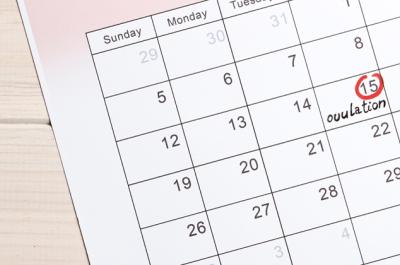Chances of pregnancy after 35

In this article
- What celebrity news doesn’t always share about the chances of pregnancy in older women:
- The times may change, but biology doesn’t
- Many underestimate the effect of age-related fertility decrease
- The effect of celebrity news stories on pregnancy plans
- How showing older celebrity mothers in the news can influence women to put off pregnancy until they are older.
- There is a difference between reality and what is shown in the news
- How does this research affect me?
What celebrity news doesn’t always share about the chances of pregnancy in older women:
In today’s busy life, many women want to actively plan their family and are waiting longer to have their first baby. However, many also expect to get pregnant quickly when they do start trying1. Some celebrity news may give the impression that getting pregnant as you get older is easy, but biology doesn’t back this up.
The age when women in the US have their first child has steadily increased in the past decades - where the average age of first birth rose from 21.4 years in 1970 to 26.3 years in 20142. More women than ever are giving birth in their 30s too: in 2015 births rates dropped to a record low in under 30s and increased significantly in women aged 30 to 40.3
The times may change, but biology doesn’t
What isn’t talked about though is that the chances of conceiving naturally haven’t changed. Research and scientific sources accept that there is an age-related decline in fertility, accelerating from a woman’s early to mid-30s.4
This gap between desire, choice and biology can cause a big dilemma when women are planning for pregnancy.5
Many underestimate the effect of age-related fertility decrease
In a survey of American undergraduates (138 Females and 108 Males)6 , many were unaware that to easily reach a goal of a family of three children they ideally need to have started trying by the age of 25 to 29.7
Some of the undergraduates also overestimated the chances of getting pregnant at any age and they thought that fertility treatments (such as IVF) were more successful than they are in reality.
For healthcare professionals, data from studies like this raises concerns, especially when you consider that the students surveyed all said they had a strong desire to have a family in the future.
The effect of celebrity news stories on pregnancy plans
Much of the news stories women see every day – from TV to the internet (social media too!) – shape and contributes to their understanding of health. So when thoughts turn to planning for a baby, it makes sense that women turn to their news feeds for information and inspiration.
We already know that the news and its influence can be powerful. For example, seeing working women in magazine content can increase the age we plan to have our first child.8
Research published in the Journal of Women’s Health in early 20199 examines whether seeing an image of a pregnant older celebrity (on covers and in features) has a similar impact. More specifically, whether it affects our understanding of our chances of pregnancy as we age.
By downplaying the effects of age on getting pregnant, news stories are likely to influence women's beliefs that they can put off pregnancy until they are older.
How showing older celebrity mothers in the news can influence women to put off pregnancy until they are older.
The authors of the above 2019 study10 analysed four years of archive copies from two popular magazines (published between January 2010 and January 2014). They found that in 416 print editions, 1,894 pieces related to fertility, pregnancy, or motherhood, and 240 individual celebrities had at least one fertility mention. They found that the average age for a celebrity who had children had their first at 33.8 years (compared to 26.8 years – the current national average).
The majority of women interviewed or featured were over 35 years old, with forty five of the subjects being at least 40 years old. Seven over the age of 44 were shown to have been pregnant and had a healthy pregnancy and birth.
Even though most of the women were aged 35 or over, the pregnancy risks for older women were only mentioned twice in the four years of material.
Only three of the articles reported that fertility treatment (ART) had been used, ten reported adoption or surrogacy.
And that’s not to mention the sensationalised headlines depicting uncommon fertility outcomes like the following:
“Baby over 40,”
“Age is just a number! Hollywood's miracle moms beat the odds,” and
“25 Stars Who Gave Birth After 40.”
Many cover stories highlighted older women getting pregnant, including a 42-year-old celebrity with the headline “My Baby Miracle.”
Another cover story about a 42-year-old celebrity came with the headline “Trying for a Baby,” and content saying “Now, at the age of 42, she’s on the fast track to motherhood”.

Brown University School of Medicine
"It's easy to get drawn in by the cover of a popular magazine featuring a happily pregnant celebrity in her late 30s or early 40s and to think that fertility is the norm at that stage in a woman's reproductive life," says Susan G. Kornstein, MD, Editor-in-Chief of Journal of Women's Health, Executive Director of the Virginia Commonwealth University Institute for Women's Health, Richmond, VA, and President of the Academy of Women's Health.
"Often left unsaid though are the costly and extraordinary measures, assisted reproductive technologies, and risks associated with these later-in-life pregnancies."
Just like with body image, magazines and the media can leave women with unrealistic expectations – in this instance, about getting pregnant in your 30s and 40s.
There is a difference between reality and what is shown in the news
This topic is tricky as the subjects of such articles (mainly celebrities) have a right to privacy when talking about their pregnancy and fertility journey, as they should. This right to privacy does mean we might not get the full story and it creates a potential gap between reality and what we read. What we don’t fully understand is the impact of this gap, but we can assume that there is a potential for women to believe delaying pregnancy can work for everyone.
How does this research affect me?
Your chance of getting pregnant does decrease with age. And while it is possible to conceive and go on to have a healthy pregnancy as a mature-mom, it’s not without risks, and it could take you longer to get pregnant. It’s also important not to leave getting pregnant up to chance, which is why understanding your fertility window and when you ovulate is so important.
If you are over 35 and have been trying for 6 months see your doctor, and, make an appointment straight away if you’re over 40, as the chance of getting pregnant decrease with age, declining rapidly after the age of 34.
Knowing what to expect and how to plan well for pregnancy, especially if you are trying later in life, can mean better outcomes for you.

Looking for insights on your health journey? Clearblue® sends you curated, science-backed articles right to your inbox.
- Zinaman, M.J., Johnson, S., Foster, L., Zanzi, G. and Mollard, C., 2019. Fertility Knowledge of Women in the United States [6M]. Obstetrics & Gynecology, 133, p.141S.
- Van Heertum, K. and Liu, J., 2017. Contraception and conception in Mid-life: a review of the current literature. Women's midlife health, 3(1), p.3.
- Hamilton BE, Martin JA, Osterman MJ, Curtin SC, Matthews TJ. Births: Final data for 2014. Natl Vital Stat Rep 2015;64:1–64.
- American College of Obstetricians, Gynecologists Committee on Gynecologic P, Practice Committee of the American Society for Reproductive M. Female age-related fertility decline. Committee Opinion No. 589. Obstet Gynecol 2014;123:719–721.
- van Noord-Zaadstra BM, Looman CW, Alsbach H, Habbema JD, te Velde ER, Karbaat J. Delaying childbearing: Effect of age on fecundity and outcome of pregnancy. BMJ 1991;302:1361–1365.
- Peterson, B.D., Pirritano, M., Tucker, L. and Lampic, C., 2012. Fertility awareness and parenting attitudes among American male and female undergraduate university students. Human Reproduction, 27(5), pp.1375-1382.
- Peterson, B.D., Pirritano, M., Tucker, L. and Lampic, C., 2012. Fertility awareness and parenting attitudes among American male and female undergraduate university students. Human Reproduction, 27(5), pp.1375-1382.
- Knobloch-Westerwick, S., Willis, L.E. and Kennard, A.R., 2016. Media impacts on women’s fertility desires: A prolonged exposure experiment. Journal of health communication, 21(6), pp.647-657.
- Willson, S.F., Perelman, A. and Goldman, K.N., 2019. “Age is just a number”: How celebrity-driven magazines misrepresent fertility at advanced reproductive ages. Journal of Women's Health, 28(10), pp.1338-1343.
- Willson, S.F., Perelman, A. and Goldman, K.N., 2019. “Age is just a number”: How celebrity-driven magazines misrepresent fertility at advanced reproductive ages. Journal of Women's Health, 28(10), pp.1338-1343




